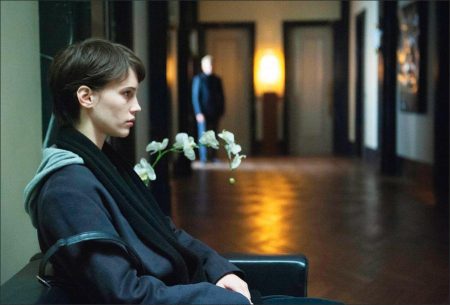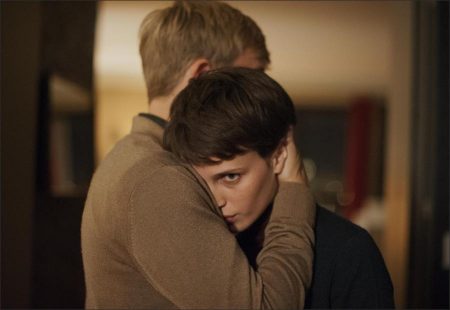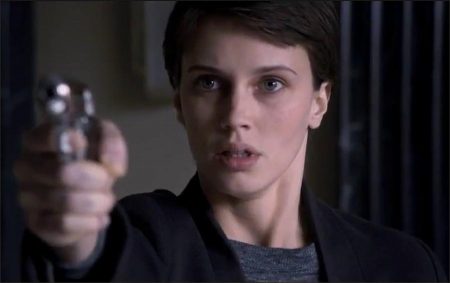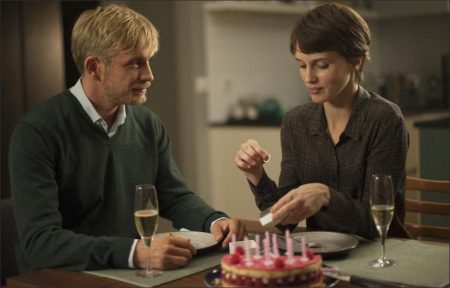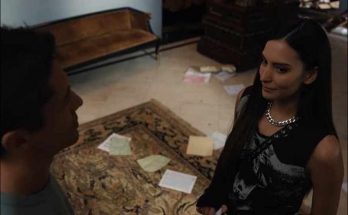L’Amant Double Movie Storyline. Disenchanted with the ephemeral glamour of the modelling world, Chloé, a vulnerable Parisian woman of 25, is convinced that the severe and persistent abdominal pains she’s been suffering, stem mainly from a psychosomatic disorder. As a result, the reserved beauty will soon find herself on the couch of the charming therapist, Dr Paul Meyer, nevertheless, the mutual and unfailing sexual attraction between them will make it impossible to continue with the therapy. Before long, the ecstatic, yet unexplored lovers will move in together, however, Paul’s obscure past will inevitably lead Chloé to the conclusion that there’s definitely more to him than meets the eye. Is the doe-eyed woman lured into a world of hallucinations and dream-like sequences?
L’Amant double (titled Double Lover in the US, and Amant Double at various film festivals) is a 2017 French-Belgian erotic thriller drama film directed by François Ozon. It stars Marine Vacth as a young woman named Chloé who discovers that her lover is concealing a part of his identity. The film was selected to compete for the Palme d’Or in the main competition section at the 2017 Cannes Film Festival. It premiered on 26 May 2017 at the Cannes, and was released to generally positive reviews from critics. At the 8th Magritte Awards, the film received a nomination in the category of Best Actor for Renier.
Film Review for L’Amant Double
It practically goes without saying that the French have different standards when it comes to kink. For example, when “50 Shades of Grey” opened overseas, the French barely raised an eyebrow, giving the tawdry sado-maso potboiler a light “forbidden to children under 12” rating, which meant that even young teens could see it.
Superior in nearly every regard — not least of all its pulse-racing perversions — director François Ozon’s “L’amant double” may as well be France’s answer to the “Cinquante nuances de Grey” phenomenon. And though nuance itself may be in short supply, Ozon has made a deliciously twisted erotic thriller in which a sexy young mental case (Marine Vacth, whom Ozon discovered with “Young & Beautiful”) gets mixed up with a pair of twin psychotherapists (both played by Jérémie Renier). One wants to marry her, while the other relies on more unconventional methods, forcing his damaged-goods patient to confront her most deeply buried secrets and desires.
For those who know Ozon’s work, “L’amant double” constitutes a most welcome return to the frisky pleasures of his early career, when he steamed up the screen with the likes of “Criminal Lovers” and “Swimming Pool.” Amusingly enough, Ozon quite literally worked in shades of gray on his previous feature, the well-received but otherwise oh-so-polite black-and-white melodrama “Frantz,” whose delicate sensitivity is nowhere to be found in his latest.
Instead, Ozon swings far in the opposite direction, using Joyce Carol Oates’ “Lives of the Twins” (written under the pseudonym of Rosamond Smith) as the leaping-off point for an elegant — if unapologetically campy — exploration of sexual repression, one whose old-fashioned Freudian sensibility lends itself to feverish delusions, extended fantasy sequences, long hallways of infinitely reflecting mirrors, and back-to-back sex scenes. While its grasp of human nature (especially that of the fairer sex) seems hopelessly dated, “L’amant double” nostalgically evokes such naïve psychological thrillers as “Spellbound” and “Basic Instinct,” suggesting some kind of mutant love child hatched between Alfred Hitchcock and Paul Verhoeven, though its fingerprints are undeniably Ozon’s.
The director announces his outré intentions from the get-go, opening with the unfamiliar sight of a gynecological exam, an extreme closeup of which fills the screen: pink, moist, and distorted just enough that it takes a moment to register what we’re looking at. By match-cutting from this ultra-intimate POV to that of a blinking eye turned sideways, Ozon intends to shock — although Lars Von Trier got there first, in “Nymphomaniac,” a movie whose playful perversity may well have made this project possible.
This peekaboo moment belongs to a 25-year-old ex-model named Chloe, who complains of stomach aches (to extend the “Nymophomiac” connection, she’s played by Vacth, who looks like Stacy Martin, and sounds like Charlotte Gainsbourg). Her doctor advises that she see a shrink, and so the timid young lady finds herself in the office of Dr. Paul Meyer (Renier), a tweedy, somewhat conservative therapist who listens quietly while she seductively over-shares. Ozon has fun with these sessions, framing them via split-screens and other Brian De Palma-esque visual tricks that serve either to double the characters, or else to push them in closer to one another, till they appear as familiar as lovers.
After a few minutes of such foreplay, Paul announces, “I have feelings that make it impossible to continue with our sessions.” That’s OK with Chloe, who feels secure in Paul’s company and wants to believe she’s cured — when, in fact, she’s anything but. She gets a cushy museum job at the Palais de Tokyo, surrounded by giant “flesh and blood” artworks that may as well have been projected from David Cronenberg’s subconscious (whose sterile twin thriller “Dead Ringers” echoes throughout), and the couple moves in together, along with Chloe’s cat — who hovers at first, to amusing effect, and then disappears, with more unsettling implications.
Although Chloe has been so forthcoming about her own anxieties, she knows precious little about Paul’s past, which makes it all the more alarming when she sees him (or someone who looks just like him) from her bus window one afternoon, far from the hospital where he works. Investigating further, she discovers that this doppelganger is in fact Dr. Louis Delord, the twin brother Paul refuses to acknowledge. Drawn to this mysterious hidden figure from Paul’s past, she assumes a false identity (which he sees straight through) and strikes up sessions with Louis — who uses aggressively sexual means to “cure” Chloe of her sexual frigidity.
Whereas cognitive behavioral therapy patients must often work through their issues over the course of months, if not years, Chloe is a quick study. Under Louis’ influence, she’s soon experiencing mind-blowing orgasms (to illustrate as much, Ozon sticks his camera where the sun don’t shine) and trying things that would make even E. L. James blush (there’s a strap-on scene that earned the film a slightly harder rating in France, though 12-year-olds can see it, “with caution”).
As Chloe’s affair with Louis heats up, she’s compelled to dig deeper into Paul’s personal history, which brings her face-to-face with a classic sex symbol, Jacqueline Bisset, who plays an important character from his past — or is it hers? By this point, the stylish funhouse mirror that Ozon has constructed has burst into such a dizzying prism of possibilities that we can no longer be sure where reality ends and delusion begins. The final explanation probably won’t surprise anyone, but it’s the teasing, tongue-in-cheek way that Ozon builds up to his final diagnosis that makes “L’amant double” such a satisfying ride.
So often, tales of schizophrenia and mental distress manifest themselves in violent ways on screen, but “L’amant double” keeps things mostly confined to the realm of the erotic. Sure, it’s kinky, but Ozon is having fun with it, to the extent that the entire film rewards that fetish all moviegoers have in common — voyeurism — offering up a kind of equal-opportunity objectification. At one point, toying with the ambiguity between his two characters, Renier actually starts to make out with himself, fulfilling a fantasy audiences didn’t know they had. What’s liberating here is the film’s lack of inhibitions, which absolves the guilt without compromising the pleasure.
Continue Reading and View the Theatrical Trailer
L’Amant Double (2018)
Directed by: François Ozon
Starring: Marine Vacth, Jérémie Renier, Jacqueline Bisset, Myriam Boyer, Dominique Reymond, Fanny Sage, Jean-Édouard Bodziak, Antoine de La Morinerie, Keisley Gauthier, Guillaume Le Pape
Screenplay by: François Ozon
Production Design by: Sylvie Olivé
Cinematography by: Manuel Dacosse
Film Editing by: Laure Gardette
Costume Design by: Pascaline Chavanne
Set Decoration by: Julien Tesseraud
Art Direction by: Lilith Bekmezian
Music by: Philippe Rombi
Distributed by: Cohen Media Group
Release Date: February 26, 2018
Views: 114

